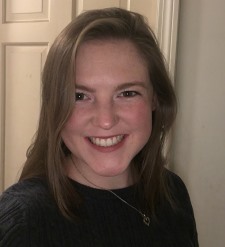
Winifred Maloney Awarded Summer 2017 Fellowship from Humanities Without Walls at Illinois Program for Research in the Humanities
“Humanities Without Walls aims to create new avenues for collaborative research, teaching, and the production of scholarship in the humanities, forging and sustaining areas of inquiry that cannot be created or maintained without cross-institutional cooperation.“ -Humanities Without Walls
Why did you apply?
I applied to the summer workshop because of its “alt-ac” focus. Coming into graduate school, I wasn’t sure about where I wanted to take my career, but I knew I wasn’t interested in entering the market for a tenure track job. Even if the market was robust, a position within the academy was just not going to be for me. When the history department won a career diversity grant from the American Historical Association, I was glad to see my department helping graduate students consider non-academic careers. Coming from this program that is now growing in its awareness of the need for career diversity in the humanities, I feel like UConn students can be frontrunners in shaping what “alt-ac” will look like for the next decades.
What do you hope will come from your experience?
The workshop will be held over the summer for three weeks in Chicago. I’m really looking forward to learning more about what careers are out there and to make meaningful connections with other fellows and speakers.
How did you hear about the fellowship?
My undergraduate advisor, Julie Mujic, sent me the call for applications post. She was instrumental in my decision to pursue history professionally by applying to Ph.D programs while in college. I have a lot to thank her for.
What can you tell us about Humanities Without Walls’ initiatives?
Humanities Without Walls is a consortium that connects the humanities centers of 15 research universities throughout the Midwest. Summer 2017 will be the third time they’ve run their summer alt-ac workshop, but the first time they’ve opened the search to a national pool. The first two workshops took fellows from the 15 universities that comprise the consortium. The consortium has been funded by a grant awarded to the University of Illinois at Urbana-Champaign by the Andrew W. Mellon Foundation.
How did you first get involved with HWW?
I applied to the summer 2017 workshop in September 2016. I had to clear an internal selection process within UConn, as only one student per university can be nominated to the workshop. Dean Holsinger nominated me, and my application then went to one of the 15 consortium center directors who passed my application into a pool of 60 nominees. From there, the Summer Workshop Steering Committee selected me as one of 30 fellows.
What is the best experience or lesson that you have taken away from HWW?
Something I’ve taken away from the application process was how eager my mentors were to help me with the application. My advisor, Christopher Clark, was excited that I decided to work on the application. I got really helpful feedback from Professors Sylvia Schafer and Mark Healey in my department, as they were successful in securing the Career Diversity grant. Dean Holsinger was great to work with and optimistic about my chances of being awarded this fellowship, so his positivity rubbed off on me as I waited for the results.
What future plans do you have that involve your work with HWW?
The workshop begins in July. Once it concludes, I hope to maintain relationships with the consortium, the fellows, and speakers.
What is some advice you would give to future candidates?
When I was writing my statement for my application, a common critique from the colleagues I asked for help proofreading was that I wasn’t confident enough in my writing. To change that, I began to focus primarily on my desire to be a leader as graduate students in the humanities seek opportunities outside the academy. Changing my tone from passive to active rounded out my application.
